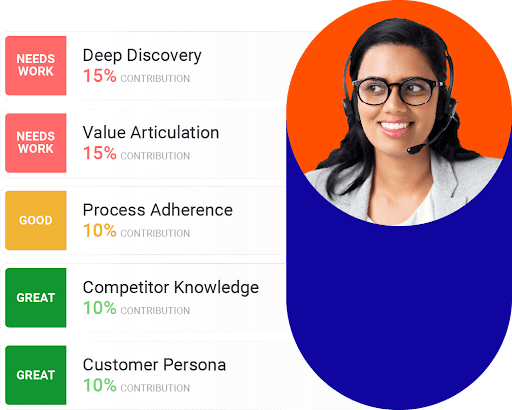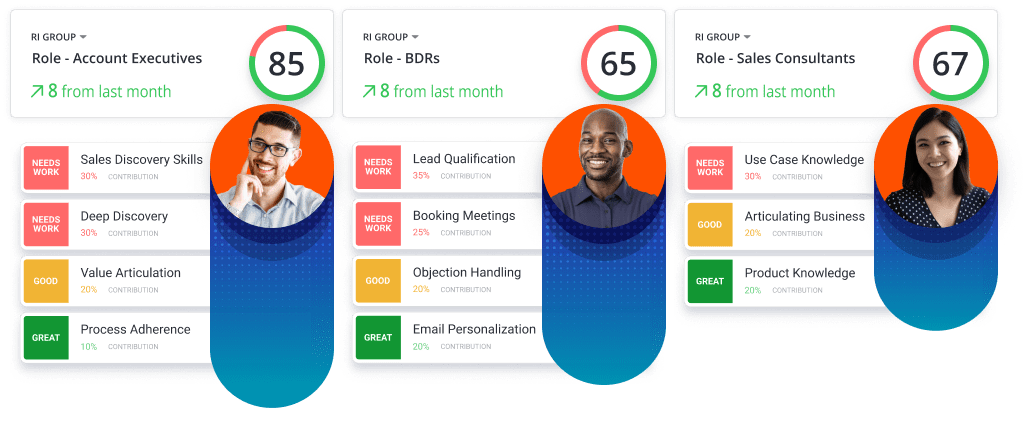Seventy-two percent of the respondents in one survey expressed they have felt remorse or regret in accepting a new job that didn’t live up to their expectations. That’s the opposite of what hiring managers want to hear after spending time, resources, and money finding the perfect candidate. Buyer’s remorse is real and it’s not something sellers should feel after just a few days on the job.
Your sales onboarding process has a direct effect on the perception new hires have about your company. Understanding how to improve the ramp-up process will increase new employee satisfaction and engagement and reduce employee churn. Here are six expert tips for making sure your new sales reps don’t feel buyer’s remorse once they’ve joined your team and begun the sales onboarding process.
Spark curiosity with engaging sales onboarding content
A pile of text-heavy learning material is not only intimidating, it’s also boring. It won’t get a new hire excited.
As Rahul Mathew, a product marketing manager here at Mindtickle, says: “If there’s too much text or assets that they need to go through, they’re just going to feel disengaged. But then how can you make it interesting for them so they feel like it’s not something being pushed down their throat, but more like something they want to do?”
The learning material must be as fun and engaging as possible to defeat new hire remorse or boredom. That can look like courses where new hires are required to interact with call recordings, practice pitches, or give feedback to colleagues as part of a process where team members learn from each other.
It’s a good idea to employ real-world use cases in learning material, so new hires can learn from past scenarios. And replicating sales situations through video recordings, audio conversations, and checklists helps new hires embrace the selling approach of your company.
Lastly, have new hires test themselves on course material via quizzes and skill assessments. This helps them practice their new skills before conversing with real prospects.
Personalize training to your new hires’ needs
Each new hire will come with a different industry background and experience. To create an exciting and relevant onboarding experience, give tailored learning according to their skill development needs.
To understand your new hires’ skill level, use assessment tests and discovery exercises during the onboarding process. This will help you acknowledge and recognize each candidate’s strengths while also developing a personalized plan to improve their weaknesses.
As Mathew puts it, “Each rep is going to have a different set of learnings. There’s gonna be a different learning curve for everybody, so there’s a need to provide individualized training. If, for example, someone is good at communication, having to go through the training again and again becomes monotonous; they’re going to disengage.
“But, of course, there are also things that same rep may not be good at and may want to focus on. That is why we’re talking about providing individualized training. And then once you’ve done this, you need to reinforce and ensure that what they’ve learned is being tested.”
In practical terms, this means developing bespoke onboarding plans that focus on strengthening a new hire’s weaknesses with the right learning material.
Avoiding redundant or unrelatable content using personalized sales training helps new hires feel less regret about their new job.
Give your new hires a vision to work toward
Clear expectations and a detailed roadmap of how to meet goals battle new hire remorse by helping new hires understand what is expected of them and how to achieve these goals. That’s where an Ideal Rep Profile comes in.
With an ideal rep profile (IRP), you’re able to formulate a “north star,” an ultimate goal to show new hires the behaviors and traits that’ll guide them toward success in their new role. This also helps new hires direct their learning efforts toward becoming an ideal rep and curtails feelings of regret when adapting to a new role.


When it comes to introducing the IRP in onboarding, Mathew gives helpful insights: “Sales leaders and managers identify all the competencies. This is the knowledge, skills, and behaviors that define what makes an ideal rep. And that can be codified within our platform. So, once you have the IRP, then you’re able to go ahead and curate or build programs around that.”
Onboarding courses and materials can then be created to replicate the strengths and strategies new hires should learn. They’re able to visualize the end goal of their efforts and understand the impact their new skills will have on sales performance.
And by having a figure to envision and achieve, employees can compare and contrast performance to pinpoint skills and strategies that need to be strengthened. As well, they will fully understand why it’s important to execute their duties in a certain way.
Guide your new hires through onboarding
New roles, tools, and company goals are overwhelming to new hires who may already feel a stark difference from their previous job. A clear roadmap to perform well in their role includes the materials each rep will need to learn and helps them overcome any feelings of confusion.
This helps sales reps control their time and understand how much should be dedicated to each learning course.
Mathew highlights the importance of time management as a key factor for onboarding success: “Let’s say you’re a learner; when you are given access to a course, you need to know how to navigate the platform. So, you need, for instance, a course map. As a learner, I know I’m expected to do five of these modules. And it’s going to take me this much time. And I need to allocate this much time towards doing this. So, that way, it’s not just that I start the course and then suddenly realize that this is taking more than four or five hours. And I honestly have just two hours to do this. So, you’re able to be in control. Do this in such a way that you’re taking it seriously, and not just stopping midway and losing that flow.”
Each course must come closely tied to a reason why and metrics that show the difference the learned skill or behavior can make to sales closing rates.
With clear onboarding guidelines and expectations, new hires won’t experience regret or be overwhelmed because they have clear next steps and are supported by their manager throughout their learning plan.
Moreover, having guided onboarding material helps your sales enablement team and managers see the progress of new hires and lets them intervene when they see any disengagement or struggles.
Encourage peer support and collaboration
Company culture plays a big role in making new hires feel welcomed and part of a team. During the onboarding process, it’s important to set the standard and show the importance of teamwork.
With peer support and collaboration, new hires can lean on their coworkers for help and get tips and resources that build trust and cooperation.
During the onboarding process, it’s important to encourage team members to learn from one another with peer reviews and personalized feedback. Creating a culture of this nature is crucial to stop new hires from feeling like they are failing at their new job and instead see feedback as an opportunity for improvement.
As cliché as the saying is, practice makes perfect, and Mathew sums up how feedback can improve performance:
“When you practice a pitch; you may want to do a few takes. You may want to correct some things, recording your attempt multiple times, and then say, ‘Hey, this is the actual pitch that I want to be judged on,’ and have that shared with an expert or a senior rep who can provide the right set of inputs.”
Nurture a feedback culture and encourage new hires to work with their team to learn from more experienced peers. The feedback, encouragement, and sense of community they receive will alleviate feelings of new job remorse.
Motivate employees with gamification
Eighty-nine percent of employees say gamification in the workplace makes them feel more productive. Gamification motivates and encourages employees to keep improving their skills in exchange for rewards and achievements.
Gamification diminishes new hire remorse by promoting status achievement and rewarding improvement. It helps new hires visualize their improved professional skills.
This is because gamification caters to the intrinsic and extrinsic motivation of employees. On the one hand, they want to compete against their peers and, on the other hand, they want to feel like they’ve improved and achieved a degree of status in the company.
Mathew gives insight into the importance of gamification in the onboarding process: “In this era where we have short attention spans — how can you keep people engaged? One of the things to do is nurture engagement through encouragement. Show people where they stand; it’s a natural tendency that if I see my peers doing better, then I’m going to make extra effort to ensure I’m not at the bottom of the class and encourage competitiveness within the teams.”
Leaderboards are great tools for encouraging employees to improve their skills or for seeing which sales reps are leading so new employees can ask them for help, tips, and insights to improve their own performance.
Improve onboarding with data insights to keep new hires on track and avoid remorse
Mindtickle provides onboarding insights and readiness scores to help managers understand when it’s time to step in and check on new hires to understand their level of engagement or stress.
This can look like having a conversation to address any issues or providing new resources to make their onboarding smoother.


Data insights help managers acknowledge employees when they’ve gained a new skill,. And with personalized data insights, managers can correlate new skills with revenue metrics to show new hires the impact of their knowledge. Each personalized approach makes employees feel appreciated and confident in their new job choice. Mindtickle delivers the data and tailored content to give new hires the relevant support needed to succeed in their roles.
Ready to learn more about Mindtickle and how to make sure your sales onboarding engages, educates, and excites your sellers? Request a Mindtickle demo today.









